|
Inside
Issue N°10 - December 2002
Consultation
calls for local initiatives in interreligious dialogue
New WCC logo
Christmas message: "Fear not!"
People (in memoriam)
Special Commission debates continue
Focolare founder's visit to WCC evokes "Spirituality
of unity"
WCC to save costs and enhance effectiveness
New ecumenical research centre
What's happening on the web?
Ecumenical accompaniers begin work in Palestine and Israel
Recent resources
General information on WCC News
NEW
WCC LOGO

The
ecumenical cross and boat have a new look! The new logo will appear
on all WCC stationery, publications and souvenirs - a change-over that
should be complete by the end of the year. While this is now the official
WCC logo, other ecumenical organizations and agencies may use their
own discretion in deciding either to adopt it or continue with the former
one. The new logo can be downloaded at: http://www.wcc-coe.org/wcc/who/newlogo-e-f.html.
Consultation
calls for local initiatives in interreligious dialogue
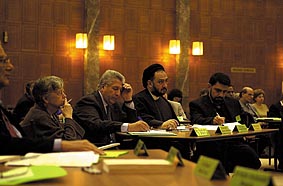
Listening
to the debate are, from the right: Dr Seyed Amir Akrmai, secretary
for interreligious dialogue, Islamic Culture and Relations Organization;
H.E. Sayyid Mohammad Ali Abtahi, president of the Institute for
Inter-Religious Dialogue and vice-president of the Islamic Republic
of Iran; H.E. Dr Abdelouahed Belkeziz, secretary-general of the
Organization of the Islamic Conference; and Rev. Margaret Orr Thomas,
Presbyterian Church (USA), member of the WCC's Interreligious Relations
and Dialogue advisory group. |
“Globalized
markets and information systems threaten to create new structures
of oppression and thus feed extremism and militancy,” says
the final report of a consultation on “Christians and Muslims
in Dialogue and Beyond”.
Forty representatives of international Christian and Muslim organizations,
scholars and activists participated in the 16-18 October consultation
in Geneva, organized by the World Council of Churches' (WCC) office
of Interreligious Relations and Dialogue (IRRD). According to
IRRD programme executive Dr Tarek Mitri, the consultation focused
on “a critical examination of the present state of relations
between the participants' respective communities, and an assessment
of what has been achieved” through inter-religious dialogue.
.
|
|
The consultation was co-chaired by WCC central committee moderator
H.H. Aram I and Dr Mohamed S. El-Awa, an author and lawyer from
Egypt. High-profile participants included H.E. Dr Mohamed Al-Sherif,
general secretary of the Islamic Call Society, and the vice-president
of Iran, H.E. Sayyid Mohammad Ali Abtahi, who is also the president
of the Institute for Interreligious Dialogue. H.E. Archbishop
Michael Fitzgerald, recently-appointed president of the Vatican
Council for Inter-Religious Dialogue, and WCC general secretary
Rev. Dr Konrad Raiser also spoke at the opening day of the event.
Journalists from Arab-language media joined French-, English-,
and German-language colleagues to cover the consultation, that
included a reception at the local mosque.
Local
intiatives
Participants expressed concern about the impact of globalized
coverage of “events where Christians and Muslims are perceived
to be in conflict”. Such reports, they said, “often
contribute to the worsening of unrelated situations. Misunderstandings,
mutual misconceptions and lack of trust are then exploited by
self-serving politicians and extremists to set the communities
against each other.” Responding to the concern, the consultation
report emphasizes “the role of education by and for our
communities as a key arena in which to create the trust and mutual
understanding which are essential to resist attempts to exploit
religious differences for destructive ends”.
In reviewing what has been done and learned about interreligious
dialogue in recent years, participants shared encouraging stories
of local initiatives to build trust and understanding by Christians
and Muslims in many parts of the world. One discussion group focused
in particular on the role of parents, teachers, and local faith
leaders in forming attitudes and behaviours in their communities,
and pointed to practical ways in which such educational initiatives
could be developed: “... education must be a collaboration
between Christians and Muslims in the development of curricula,
textbooks and teacher training: we can no longer talk about each
other but must talk with each other”.
The message at the heart of the consultation was that local initiatives
will be the main source of models of new ways of living together.
While high-level gatherings will continue to allow important exchanges,
real change will happen in the communities in which Christians
and Muslims live, pray, worship and work together, the consultation
said.
|

Christmas
message: "Fear not!"
 |
Human
fears, reactions to fear, and God's gift of liberation are the subject
of this year's Christmas message from the World Council of Churches.
The message, from general secretary Rev. Dr Konrad Raiser to WCC
member churches, begins by naming some of the fears that people
in different parts of the world are struggling with as they approach
Christmas this year. |
Pointing
to the existence of “a widespread sense of insecurity and powerlessness”,
Raiser uses the story of the shepherds near Bethlehem on that first
Christmas night, who are suddenly confronted with the overwelming power
of the holy, to suggest that “fear is not a sign of human weakness
to be concealed. In the emotion of fear, we anticipate a potential danger
or threat and mobilize possible defences. The fear of God or the holy
one is known in all religions. In this fear, we acknowledge that our
life is vulnerable... We need not be ashamed of our fears: they remind
us that we are human creatures and not God.”
How
do we respond to fear? Raiser notes that while fear can bring people
closer to one another and/or mobilize them to common action, it can
also cause them “to follow blindly those who offer or promise
security”. This may lead to exploitation and disempowerment. How
can we avoid that, and “How can we break the vicious circle that
the very search for security becomes itself the source of increased
fear - that security measures become ends in themselves?” Raiser
asks.
“God
knows our human fears, but God wants to take them away,” is the
answer he offers to his own question. Referring back to the angel's
message to the shepherds - “Fear not: for see - I am bringing
you good news of great joy for all the people” (Luke 2:10) - Raiser
suggests that “God does not offer us security, but the utterly
vulnerable love in the child of Bethlehem. It is the love of 'God with
us' that can cast out fear (1 John 4:18) and liberate us from the idolatry
of security.” Reminding us that this is also the message of the
Ecumenical Decade to Overcome Violence, he concludes with the apostle
Paul's conviction that nothing “in all creation will be able to
separate us from the love of God in Christ Jesus our Lord” (Rom.
8:38f.).

PEOPLE:
In Memoriam
|
Rev. Dr Richard Shaull of the Presbyterian Church,
USA (formerly the United Presbyterian Church of the USA) was a former
president of the World Student Christian Federation (1968-72) and
played a key role in the Geneva conference of Church and Society
in 1966. His early ministry was spent as a missionary in Colombia
and Brazil, and his latest appointment was as professor of Christian
mission at Princeton Theological Seminary (USA). He was a visiting
professor at the Ecumenical Institute at Bossey from 1962-63. World
Council Churches (WCC) general secretary Rev. Dr Konrad Raiser spoke
of him as one “of the group of creative and influential theological
minds who have contributed decisively to the ecumenical renewal
in theology and to preparing the way for the articulation of contextual
theology”. He was 82. |
A former WCC Communication staff member, the Rev. C. Michael
de Vries, died 11 November in the Netherlands at the age
of 79. He was the communication secretary for radio and television.
His work culminated in the establishment of Intervox, which regularly
produced taped interviews for radio stations around the world. He
had a particularly important communication role in two WCC assemblies
in Uppsala (1968) and Nairobi (1975), including the production of
radio cassettes on issues facing the assemblies. Raiser described
him as a “gifted translator... a gentle and sensitive person
with a deep faith commitment, who considered his work with the WCC
as a particular ministry which he was called to exercise”. |
|
The former dean of Frankfurt, Dr Dieter Trautwein
died on 9 November 2002 at the age of 74. A liturgist and theologian,
Trautwein was the enthusiastic creator and translator of numerous
songs and hymns now used by congregations in Germany and beyond.
At the beginning of the '50s, he participated in one of the first
ecumenical seminars at the Bossey Ecumenical Institute. Later on,
as a youth pastor, he played a significant role in editing a revision
of the well-known ecumenical songbook Cantate Domino. He participated
in the Faith and Order Commission meeting in Accra (1974) and played
an important role in preparing the common worship for the WCC assembly
in Vancouver (1983). Deeply concerned by questions of justice and
forgiveness, Trautwein devoted much energy to ecumenical solidarity
with churches in South Africa, and to maintaining alive the memory
of the Shoah. He became a member of the Presidium of the German
Kirchentag in 1977. Trautwein leaves behind him a rich hymnologic
heritage for common Christian worship. |
|
|
Special
Commission debates continue
The
report of the Special Commission on Orthodox Participation in
the World Council of Churches (WCC), received by the last meeting
of the central committee, continues to get varied reactions. One
member, Bishop Dr Margot Kässemann of Germany, has resigned
from the committee because she believes the document “implies
crucial changes for cooperation among the member churches,”
particularly in regard to ecumenical worship. Another German bishop,
a former moderator of the central committee and now retired, Bishop
Heinz Joachim Held, has written: “I am convinced that the
Orthodox provocation in the run-up to the eighth assembly was
not only understandable and justifiable from an Orthodox point
of view, but [...] also necessary, beneficial and worthwhile to
the WCC.”
| Most
comments have focused on the proposals for redefining what
is meant by ecumenical worship or common prayer, and what
guidelines are necessary for preparing worship at ecumenical
events. Some churches experience praying together as one of
the most authentic ways of searching for unity. But Orthodox
commentators point out that “prayer can also be a point
of disagreement between churches and might even show greater
unity than is the case”. |
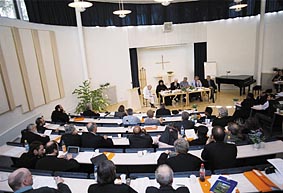
The
Special Commission met for the last time at Järvenpää,
Finland, 27 May-2 June 2002. |
They
call for ecumenical sharing of worship in which one confession
leads the worship and others join. They object to a liturgy which
uses symbols, prayers and liturgical extracts from different confessions.
“That only causes confusion,” say some Orthodox commentators.
This view has drawn a variety of reactions. A WCC Presbyterian
staff member, speaking at a WCC staff workshop on the Special
Commission report, said: “Our annual general assembly features
an 'Ecumenical Service of Worship' through which Presbyterian
leaders encourage participants to go home and organize local expressions
of ecumenical worship. If the WCC now tells us that there is no
such thing as 'ecumenical worship', we face some difficulty explaining
that within our own church, as well as a rethinking of our relations
with other churches.”
“We have to take care not to exercise spiritual violence[...],”
says Held. “I believe this concern for the identity and
integrity of others to be one of the fundamental marks of New
Testament humility, which is one of the decisive ecumenical virtues.”
New proposals that the WCC should use a consensus model for decision-making
in all its meetings have generally been well received, though
there are clearly different understandings of what consensus means
and how it should be achieved. Even within the central committee
debate, there were some strong words. “Let us be honest
with each other. Some of us are afraid [that consensus] can be
misused as another way of playing the power game,” said
one member. Another even called it a “document of fear”.
This drew a counter response: “This is not necessarily a
step backward out of fear. It comes out of a dialogue of love
moving towards a dialogue of truth and authenticity.”
Finally, the central committee agreed to test the consensus process
at its next two meetings in 2003 and 2005.
WCC general secretary Rev. Dr Konrad Raiser believes that the
report has the potential to help the Council “go beyond
a particular institutional identity that it has received from
the founding generation, which was deeply rooted in a particular
Protestant tradition”. He hopes that this will make the
WCC more ecumenical. “The Special Commission has demonstrated
that, as long as we try to spell out the difficult relationship
between the Orthodox and other churches in the fellowship in terms
of power conflict, it is unsolvable and will break the WCC apart,”
he warns.
|
|
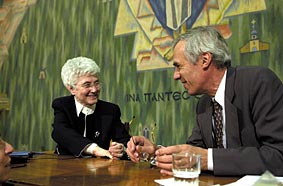
Chiara
Lubich, founder and president of the Focolare Movement, with WCC
general secretary Rev. Dr Konrad Raiser during Lubich's visit
to the Ecumenical Centre on 28 October 2002.
For
more information on the visit of Chiara Lubich to the WCC, see:
http://www2.wcc-coe.org/PressReleases_en.nsf/index/info-02-11.html |
Focolare
founder's visit to WCC evokes “spirituality of unity”
The
long search for unity and its “recent difficulties... have led
people to speak of stagnation, or a winter period, in ecumenism”,
states a joint message on Christian unity released by Dr Chiara
Lubich, founder and president of the Focolare Movement for spiritual
and social renewal, and World Council of Churches (WCC) general
secretary Rev. Dr Konrad Raiser following Lubich's visit to the
Ecumenical Centre on 28 October. The message goes on to stress
both leaders' “renewed hope for our common ecumenical journey”
through “a spirituality to be lived that we can call a 'spirituality
of unity'”. |
Lubich's
visit to Geneva - which included a seminar with students and faculty
at the Ecumenical Institute in Bossey on 26 October, and worship
at St Peter's Cathedral in Geneva on 27 October - came at Raiser's
invitation. During her meetings with staff at the WCC, Lubich
noted that this “spirituality of unity”, which “requires
us to empty ourselves as Christ did”, is the Focolare contribution
to overcoming “collective disunity” not only among
churches but among humanity as a whole. Raiser recalled that one
of the key insights from the 1925 Stockholm Life and Work conference
was that “the closer we come to the cross of Christ, the
closer we come to each other”. In expressing appreciation
for the emphasis on spirituality, he noted that “our search
for unity is not to construct edifices, but to pull down all that
divides us”.
In an earlier press conference, WCC deputy general secretary Mr
Georges Lemopoulos welcomed Lubich's third visit to the WCC, and
noted that “the WCC always engages with enthusiasm all those
who have the vision and work for unity”.
During her visit, Lubich made a generous donation for the work
of the WCC in interreligious relations. |
 |
WCC
to save costs and enhance effectiveness
The
World Council of Churches (WCC) has announced plans to reorganize its
Geneva- and New York-based staff around the five “historic”
themes of the Council's work. The five themes are faith and order; mission
and ecumenical formation; justice, peace and creation; international
affairs, peace and human security; and diakonia and solidarity. The
reorganization reflects the WCC's need to reduce planned expenses for
2003, and new thinking on how to fulfil the Council's mandate of seeking
unity and cooperation among its 342 member churches worldwide.
According to WCC general secretary Rev. Dr Konrad Raiser, “The
Council, through this reorganization, has manifested its will and its
ability to respond constructively to a critical situation. The adjustment
of the internal organization and leadership structure will result in
a clearer profile of the WCC's programmes and strengthen its cooperation
with ecumenical partners.”
Via the reorganization, and faced with a predicted shortfall of income
against planned expenses of CHF 6.3 million, the WCC has reduced its
budget for 2003 by CHF 7.4 million. This amount includes a CHF 1.1 million
surplus which will allow the Council to begin replenishing its general
reserves and to provide a cushion for contingencies. The reduction in
budgeted expenses for 2003 is to be accompanied by an income-generating
strategy that will focus on assuring the ongoing support of current
donors, and then seek to establish relations with new donors.
Financial pressure on the WCC is due to a combination of reduced contributions
from donors and losses in the value of its investment portfolio. This
led to a large draw-down on the organization's reserves over the last
three years. The WCC's policy decision-making body, the central committee,
at its meeting in Geneva in September 2002 called for the creation of
a task group of four central committee members to review the situation
and advise staff on the steps needed to reduce expenses. Their report
was received by the WCC officers and other assigned central committee
members who met in Geneva 14-15 November.
As a result of the announced expense budget cuts for 2003, WCC staff
will be reduced by 16 full-time equivalent positions to a level of 141
FTE's. This reduction will be achieved in part due to retirements, relocation
of activities and staff positions in cooperation with regional partners,
reductions of working time, and termination of contracts.
“We hope that these changes in the organization will lead to a
period of stability in which the staff, member churches and other supporters
of the WCC are able to devote themselves to meeting the global ecumenical
challenges before us,” says WCC vice-moderator Dr Marion Best.

Recent
Resources
| Indispensable
to university and seminary libraries and all those interested
in ecumenism!
THE
DICTIONARY OF THE ECUMENICAL MOVEMENT
Nicholas Lossky, José Míguez Bonino, John
Pobee, Tom Stransky, Geoffrey Wainwright and Pauline Webb,
eds
This title has become a standard reference work since
its original publication in 1991. In this second edition,
nearly 700 entries - by some 370 leading figures in the
ecumenical movement from every Christian confession and
all parts of the world - define and explore the history,
churches, people, issues and terminology of the ecumenical
movement. The original 650 articles have been updated
and some 50 new ones added, to take into account the momentous
changes of the 1990s. Articles are fully cross-referenced,
and many are enhanced by short bibliographies.
1332pp., illustrated, Sfr.125.00, US$77.50, £58.00,
Euros 79.00 |
Masao Takenaka
WHEN THE BAMBOO BENDS
Christ and Culture in Japan
A visual and thought-provoking exploration of spirituality
in the Asian Christian tradition. In Japan in particular,
bamboo is a key cultural symbol, whose characteristics are
interpreted in the light of their religious significance.
86pp., illustrated, Sfr.14.00, US$8.50, £5.95, Euros
9.00
Christoph
Stückelberger
GLOBAL TRADE ETHICS
An Illustrated Overview
This introduction to trade ethics asks topical questions
and reveals approaches and strategies which can foster
responsible arrangements for trade at global, national,
corporate and individual levels.
248pp., Sfr.28.00, US$16.95, £11.95, Euros 19.00,
German (available), French (in preparation)
|
|

New
ecumenical research centre
With
more than 100,000 books, periodicals and pamphlets pertaining to the
20th-century ecumenical movement and a wealth of archival material,
the Geneva Ecumenical Centre and Bossey Ecumenical Institute libraries
house the largest such collection in the world. As World Council of
Churches (WCC) librarian Pierre Beffa points out, 97 percent of the
shelves are occupied. But it is more than merely a question of space.
If historical material is to be usefully archived, and new material
added, careful thought needs to go into the future development of the
two libraries to function as one coherent whole, offering good facilities
for researchers.
Which is where a Geneva bank comes into the picture. Banque Pictet has
informed the WCC of its decision to make a CHF 3.7 million grant for
a centre for ecumenical research. WCC staff are currently identifying
needs related to records, historical, and sound/video/photo archives
management, and comparing various information technology archives- and
library-management systems. The grant will allow the libraries and archives
to be fully catalogued and become more accessible not only to researchers
but also to those with access to the world wide web.
Beffa, who retires at the end of 2002 after 37 years of service, is
both excited by the new horizon, and impressed by the magnitude of the
task ahead. The ongoing challenge of “one ecumenical library on
two sites”, he explained to WCC News “is to make them work
well together!”

|
What's
happening on the web?
Many ecumenical groups and organizations today are creating “online
communities”. Whether a discussion board, news-group, list-server,
chat-room, or some other form of live exchange on the world-wide
web, those who design and moderate such communities are having
to invent the rules as they go along. Young Leaders On-Line is
a “tool-kit” on how to lead online communities.
A joint project of the World Council of Churches (WCC) and Vesper
Society (USA), Young Leaders On-Line identifies different types
of online communities and offers advice on defining rules to govern
online community behaviour, choice of appropriate technology, and
the qualities - technical, social and visionary - required to lead
such communities. http://www.onlineleaders.info.
|
| 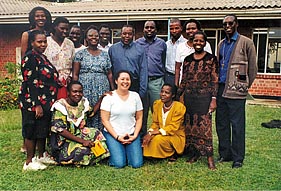
Group of
WCC-sponsored students from seven African countries at the Mindolo
Ecumenical Foundation (MEF) in Zambia. Established in 1958 to
train Africans for leadership roles, the MEF is a pan-African
ecumenical institution.
http://www.wcc-coe.org/wcc/what/education/scholarships-e.html |
On
the redesigned scholarships web-page, the message is clear: “WCC
scholarships are about investing in the future of the community.”
Designed to help churches equip people to fulfil their mission,
they go to individuals who have been nominated by a church or related
ecumenical organization. Applications are endorsed by national correspondents
before going to Geneva. Scholarship holders benefit from ecumenical
exposure and formation in countries other than their own; they undertake
to use what they learn in identified roles on their return. The
new web-page provides information on criteria and procedures, application
forms, news on scholarship holders and a list of national correspondents
around the world. |
| The
WCC Decade to Overcome Violence (2001-2010) calls churches, ecumenical
organizations and “all people of good will” to work
together - with communities, secular movements, people of all living
faiths - for peace, justice and reconciliation. In order to help
that happen and to promote networking, the Council is designing
a new web space where information, ideas, stories, pictures, reports
and resources relating to the Decade will be invited and received,
sorted and shared. Watch the WCC homepage for news on the launch
of the new interactive DOV website! |

| Ecumenical
accompaniers begin work in Palestine and Israel
Vests
with the logo of the Ecumenical Accompaniment Programme in Palestine
and Israel identify the 17 participants currently working with
local churches, church-related organizations and Palestinian and
Israeli peace groups in Jerusalem, the Gaza Strip, Ramallah, Beit
Sahour and Nablus. Here in the photo: accompaniers join Israelis
and Palestinians demonstrating against the Israeli-constructed
wall between Abu Dis and Jerusalem. The wall cuts 60,000 Palestinian
residents off from the city of Jerusalem. |
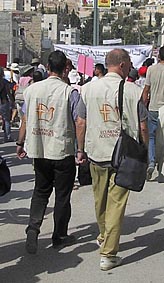 |
To
date, over 40 churches and ecumenical partners are participating
in the Ecumenical accompaniment programme. This first group of
accompaniers come from Sweden, Denmark, Germany, Norway and the
United States.
A
new 22-minute video, “Ending Occupation: Voices for a Just
Peace”, is available in English. Produced by the WCC in
cooperation with ACT International and the United Church of Canada,
it features interviews with local church and religious leaders
and Palestinian and Israeli human rights activists, and outlines
the root causes of violence in the region and opportunities for
a just peace. Available from WCC International Relations, endoccupation@wcc-coe.org
For
more information, see http://wcc-coe.org/wcc/what/international/palestine/index-e.html |
As this edition
of WCC News goes to press, a WCC pastoral delegation
is returning from a 2-9 November visit to Pakistan to listen and learn
from people about the situation in Pakistan as a result of the war in
Afghanistan, and the challenges facing the churches there. Reflections
from the visit will be included in the next edition of WCC News.
WCC
News is published four times a year and distributed free of
charge.
However, if you wish to make a contribution (the equivalent
of US$20 minimum), payable by cheque made out to "WCC"
or Visa or Mastercard, this would be welcome. Please indicate "For
WCCNews"
Produced by:
WCC Public Information
Team
Managing
editor:
Kristine Greenaway
For further information write to:
WCC NEWS, WCC Communication, P. O. Box 2100, 1211 Geneva 2, Switzerland
Telephone: (41-22) 791 6111; General Fax: (41-22) 791 0361; E-mail
for enquiries: bob@wcc-coe.org;
WCC Communication fax: (41 22) 798 1346
Please feel free to reproduce this material and pass it
on, acknowledging the source
Design:
Marie Arnaud Snakkers
Printed in Switzerland
©WCC
Original: English |
©
2002 world council of churches | remarks to
webeditor@mail.wcc-coe.org
|
